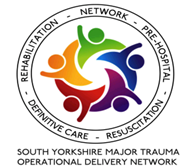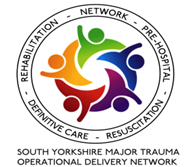


Information for patients & relatives

What is a Major Trauma Network?
Major Trauma Networks comprises of a collection of service providers and personnel, who serve a defined population and aim to reduce death and disability following injury. Each Network is served by one or more Major Trauma Centres, along with a number of smaller hospitals called Trauma Units, and several pre-hospital care providers. Since the introduction of these Networks in England, critically injured patients now have a much better chance of survival. Major Trauma Centres operate 24 hours a day, 7 days a week and are staffed by consultant led specialist teams with access to the best diagnostic and treatment facilities, including orthopaedics, neurosurgery, cardiothoracics and radiology teams.
All the work that representatives from our Network and the stakeholder organisations have carried out has helped to develop a dedicated Major Trauma Service and we will continue to progress the development of the Network in order that it meets the needs and expectations of patients, their families and carers, its stakeholders and associated providers.
What is Major Trauma?
Patients with Major Trauma are those with serious multiple injuries that require 24/7 emergency access to a wide range of clinical services and specialist expertise. For example, Doctors may be required to attend to a patient with head and neck injuries, chest, pelvis and other bone fractures. Major Trauma can happen as a result of many mechanisms such as:
- Road Traffic Collisions
- Industrial Accidents
- Falls
- Leisure Activities
People who suffer serious injury (major trauma) need the highest quality specialist care to give them the best chances of survival and recovery. Access to the right service at the right time first time is therefore crucial for the survival of a Major Trauma patient.
Ambulance crews (pre-hospital care providers) will use an agreed protocol (Major Trauma Triage Tool) to support decisions to take injured people to the hospital most suited to their needs based on the review of their injuries sustained. Patients with a severe injury will be assessed by ambulance staff at the scene of the incident. They will then be taken by ambulance direct to the nearest major trauma centre if it is safe to do so and the patient does not need stabilising. If a patient needs to be stabilised first, he or she will be taken to the nearest trauma unit. For less severe injuries, patients will be taken to the nearest trauma unit. Patients with less severe injuries, urgent or emergency care needs are treated by their local A&E, Minor Injuries Unit or GP, as appropriate.
Our Network Services
Major Trauma Centres
Sheffield Teaching Hospital NHS FT
The Major Trauma Centre at Northern General was established in 2012. The Major Trauma Centre operates as the hub of the South Yorkshire Major Trauma Operational Delivery Network, serving people in South Yorkshire, with cross border cover into Derbyshire via Chesterfield Trauma Unit and the paediatric trauma units at Scunthorpe and Diana Princess of Wales Hospital, Grimsby (Northern Lincolnshire & Goole NHS FT)
Sheffield Children’s NHS Foundation Trust
Sheffield Children’s Hospital was first established in 1876. Since 1948 it has provided services under the NHS and in 1992 it was established as an NHS trust.
On August 1 2006, it became Sheffield Children’s NHS Foundation Trust under the Health and Social Care (Community Health and Standards) Act 2003. Sheffield Children’s Hospital NHS FT is one of only three dedicated children’s hospital trusts in the UK and provides integrated healthcare for children and young people, including community and mental health care as well as acute and specialist services for the paediatric population of Sheffield and South Yorkshire, including paediatric major trauma.
Trauma Units
- Barnsley Hospital NHSFT
- Doncaster & Bassetlaw Hospital NHSFT
- Chesterfield Royal Hospital NHSFT
- Rotherham Hospital NHSFT
- Northern Lincolnshire & Goole NHSFT (Grimsby and Scunthorpe – paediatrics only),
Major Trauma Pathway of Care
The integrated major trauma pathway consists of four phases of care post incident, which are referred to as pre-hospital, reception and resucitation, definitive care and rehabilitation, summarised as follows:
Pre Hospital Support and Trauma Admission to Hospital
Our Network geographical area is supported by the services of the Yorkshire Ambulance Service, East Midlands Ambulance Service, EMBRACE (Yorkshire and the Humber Infant & Children’s Transport Service) with access to the respective air ambulance services of Yorkshire Air Ambulance, Derbyshire, Leicestershire and Rutland Air Ambulance and Lincolnshire and Nottinghamshire Air Ambulance
Adult or paediatric trauma admissions to hospital are as a result of pre-hospital decisions primarily taken directly from the scene of a trauma via the ground and air ambulance services. The provision of a ground helipad situated on site enables access to the Emergency Department. In addition, the Major Trauma Centres take secondary transfers from the Trauma Units within the Network.
Patients with severe multiple injuries have a better chance of survival and recovery under a regional Major Trauma system, where all acute hospitals and the ambulance services (pre-hospital providers) work closely together to provide an integrated response, following agreed and defined guidance and policies. Guidance and policies are regularly reviewed at Network level via the South Yorkshire Major Trauma Clinical Advisory and Assurance Group and feedback and lessons learned are disseminated to the Trauma personnel within the Network.
Reception and Resuscitation
The hospital reception phase of major trauma management requires a great number of expedient decisions. A coordinated trauma team will therefore assess a patient and make rapid and systematic real time decisions on the course of action, which may involve imaging and specialty involvement especially for complex conditions.
Definitive Care
Definitive care is provided via inpatient management from multi-specialty/ multidisciplinary teams experienced in the management of major trauma patients, including any acute rehabilitation phase of care required. A patient will be treated by the specialist teams until they are fit for discharge and no longer require the specialist services of the major trauma centre, or may referred for ongoing specialist major trauma rehabilitation.
Major Trauma Rehabilitation
The aim of the Rehabilitation service is to return patients back to full active lives and pre-incident status wherever possible and the rehabilitation needs of a major trauma patient need to be assessed from the day of admission. The Major Trauma Network is working closely with its stakeholder partners and commissioning bodies to support the delivery of complex rehabilitation services in order to build on existing resources available.
Hospital Contact Information Links for Patients & Relatives
Sheffield Teaching Hospital NHS Foundation Trust
Sheffield Children's NHS Foundation Trust
Barnsley Hospital NHS Foundation Trust
Chesterfield Royal Hospital NHS Foundation Trust
Doncaster & Bassetlaw Teaching Hospitals NHS Foundation Trust
Rotherham Hospital NHS Foundation Trust
INFORMATION LINKS FOR PATIENTS, RELATIVES & CARERS
Headway – The Brain Injury Association – life after brain injury
Access denied
This content is only available to people on the NHS network. If you are having trouble viewing this content and you are on the network, please contact us.
Close window